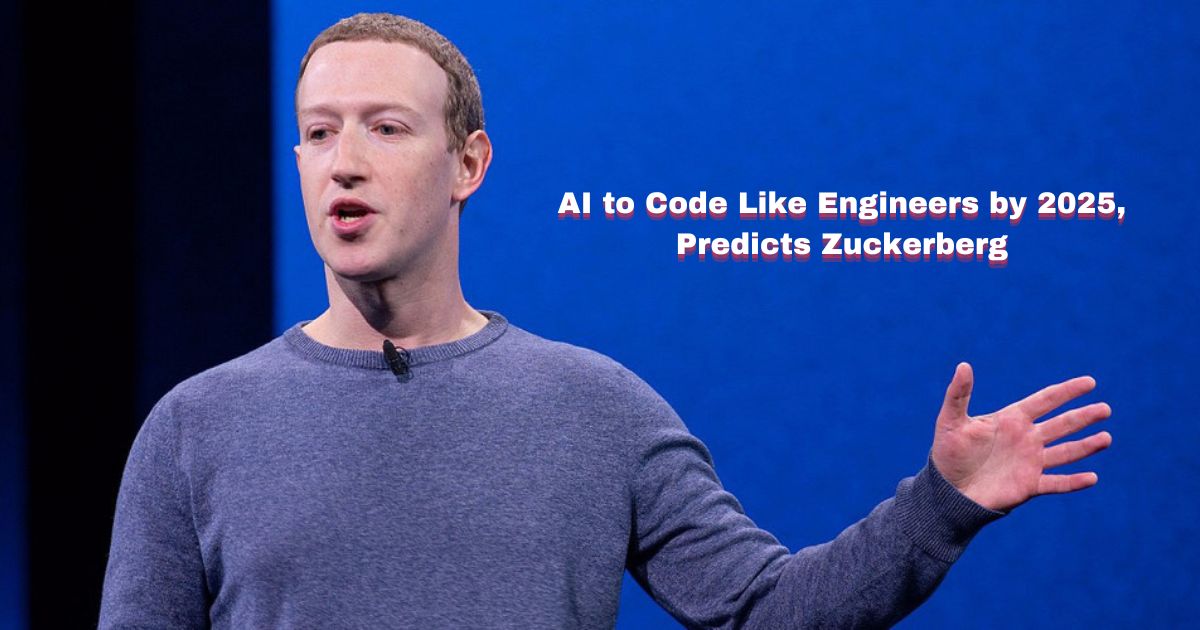In a bold forecast that has caught the attention of the tech world, Mark Zuckerberg, the CEO of Meta, has predicted that by 2025, artificial intelligence (AI) will be capable of coding with the proficiency of a mid-level engineer.
This vision of AI’s transformation in the software development landscape opens doors to a range of possibilities, from automation of routine coding tasks to radically altering the roles of developers themselves.
Meta’s Push for AI Integration
Meta has long been invested in advancing AI technology, and Zuckerberg’s prediction fits squarely within the company’s strategic vision.
Recently, Meta introduced Metamate, an internal tool built from the company’s Llama language model, designed to enhance the productivity of its software engineers.
This AI system promises to streamline routine tasks such as drafting communication, coding, and even aiding in research.
Meta’s Llama 3.1 model—released in 2024—boasts an impressive 405 billion parameters. The tool, which was built using more than 16,000 high-powered Nvidia H100 GPUs, demonstrates how AI can assist in automating complex tasks, including code generation.
As part of Meta’s mission to provide more AI tools, Llama 3.1 is an open-source model available for developers to integrate into their work.
This gives an indication of how AI, like Metamate and Llama, could evolve to handle an increasingly significant portion of the software engineering process.
AI in Software Development: Benefits and Challenges
The benefits of AI in the realm of software development are clear. AI-driven tools, such as GitHub’s Copilot, have already proven to be successful in generating code snippets and debugging existing code, allowing developers to focus their time on higher-level, more creative tasks.
With advancements like these, it’s no surprise that Zuckerberg predicts a rapid transformation. However, the prospect of AI matching the work of mid-level engineers involves more than simple task automation.
Engineers are responsible for handling complex requirements, system architecture, and addressing unique challenges that often require human judgment and problem-solving.
Building an AI system that can manage such intricacies with the precision of a skilled developer remains a formidable challenge that will require ongoing innovation.
Job Shifts and Future Opportunities
Zuckerberg’s prediction also raises an important question about the future of work in technology. While fears of AI displacing human workers are valid, historically, technological advancements have resulted in the creation of new jobs, often in areas where human expertise is indispensable.
As AI systems take on more routine coding responsibilities, engineers may find themselves transitioning to roles that require higher levels of creativity, complex problem-solving, ethical oversight, and system design.
Moreover, the rise of AI in development may allow smaller startups to leverage advanced tools once available only to large tech companies, leveling the playing field in innovation.
Human developers, in turn, could embrace more challenging, non-repetitive tasks that push the boundaries of what technology can achieve.
Looking Ahead to 2025
Zuckerberg’s 2025 timeline represents just one of many projections regarding AI’s role in the workforce of tomorrow. What is certain is that AI is moving rapidly in the direction of becoming an indispensable part of coding and software development processes.
With advancements in natural language processing, AI-powered IDEs (Integrated Development Environments), and smarter tool integration, the boundaries of what AI can achieve in code generation will only grow wider.
As we move closer to 2025, the collaboration between human developers and AI is likely to redefine both the role of the engineer and the tools they use. With continued investment in AI and its potential to streamline and enhance development workflows, the future looks bright for both AI and the engineers who will partner with it.
Conclusion
Mark Zuckerberg’s ambitious prediction that AI will be able to code like mid-level engineers by 2025 reflects the astonishing progress that artificial intelligence continues to make. With tools like Metamate, Llama, and others paving the way, AI is not just an assistive tool—it’s on the cusp of becoming a full-fledged co-developer.
The implications for the tech industry are vast, offering the opportunity for humans and AI to work in tandem, amplifying creativity while rethinking the very nature of software development.
The potential for AI in coding, while still under development, provides a glimpse of how the future may unfold—and it may involve collaboration, innovation, and the possibility of unprecedented progress. For more Artificial-related information check the internetverizons.
